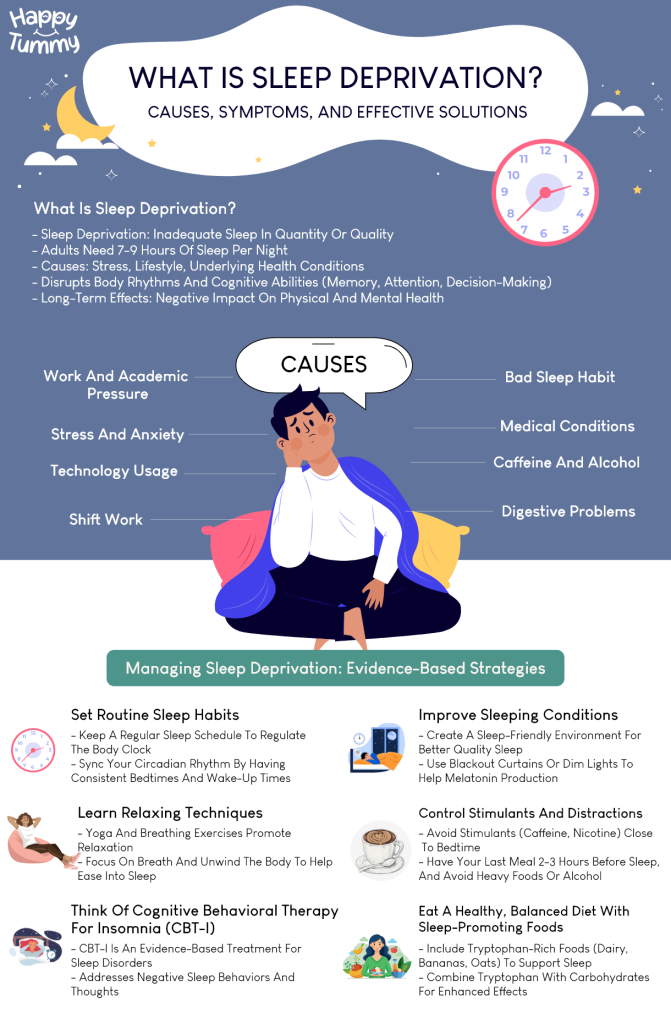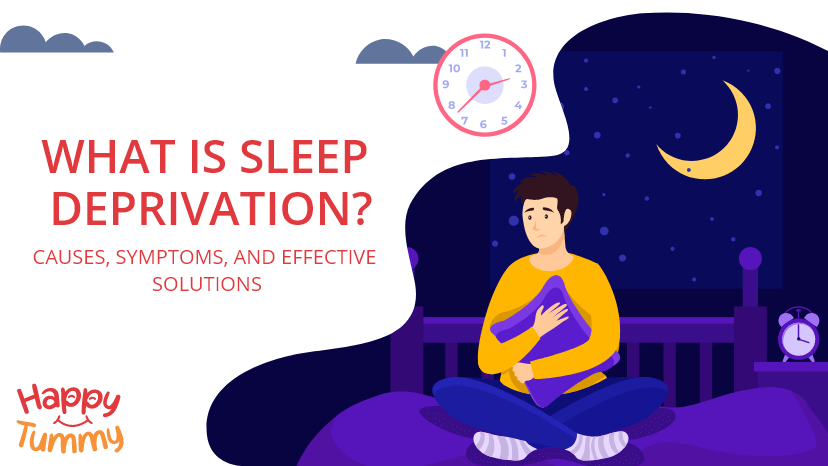Table of Contents
Have you ever thought about how a couple of sleepless nights may influence your body and mind? Lack of sleep leaves many people feeling out of balance in a fast-paced modern world.
Owing to the effects of stress, improper sleeping patterns, or excessive workload, sleep deprivation causes exhaustion that may seriously affect the physical and mental health of the individual.
But do you know that low sleep can also result in changes in mood, memory issues, etc., and also the development of chronic illnesses such as high blood pressure or diabetes.
Sleep deprivation at odd late night is not likely to be harmful, but extended patterns can be destructive.
In our blog post, we will discuss the reasons, signs, and interventions of sleep deprivation, so you can know how to cope with and combat this silent epidemic.
So, without any more dilly-dallying, we are going to unveil the science of sleep and reveal why a decent night of sleep matters more than we usually imagine.

What is Sleep Deprivation?
Sleep deprivation is the situation of having inadequate sleep in quantity or quality. Adults need an average of 7-9 hours of sleep per night, and failure to sleep would end up causing sleep deprivation.[1]
This may be as a result of a number of factors, including stress, lifestyle, and even other underlying health conditions.
Persistent sleep disorders disrupt the normal rhythms of the body, deteriorate cognitive abilities, such as memory, attention, and decision-making, and have adverse long-term effects on health, both physical and mental.
Causes of Sleep Deprivation
Sleep deprivation may be attributed, amongst others, to lifestyle choices and medical conditions. Some of the common causes are:
1. Bad Sleep Habits
It might be more challenging to fall asleep and keep a regular sleep schedule when habits like going to bed at various times on several nights throw off the body’s internal clock. Next are the poor sleeping conditions, including a bad mattress or a loud environment.
2. Stress and Anxiety
Having high stress or anxiety may leave the body in a state where it cannot relax the mind to be able to sleep.
Chronic stress can also lead to insomnia in the long run, and this can only exacerbate the problem associated with sleep deprivation.
3. Work and Academic Pressure
Excessive working hours, tight deadlines, and the demands of education may also put people in the position of cutting back on sleep in exchange for increased output. This endless trend of deprivation may bring about cognitive setbacks and emotional stress, impairing performance on the whole.
4. Medical Conditions
Sleeping disorders like insomnia or sleep apnea may result in frequent disruption to sleep, which makes the patient lack sleep.
Other chronic illnesses, such as pain or restless leg syndrome, may also prevent one from sleeping peacefully throughout the night.[2] Both sleep deprivation and insomnia have been linked to increases in the incidence and prevalence of hypertension. [3]
5. Caffeine and Alcohol
The stimulant effects of caffeine can keep people awake if taken too late in the day.
Alcohol can, on the one hand, make people fall asleep, but on the other hand, it interferes with later stages of sleep as well, causing people to sleep poorly.[4]
6. Technology Usage
The blue light used in smartphones, tablets, and computers is disruptive to the production of melatonin, which is vital in regulating sleep patterns.
Long hours in front of a screen before bed may delay bedtime and even impair sleep, leading to more struggles to stay awake later.[5]
7. Shift Work
Employees who work at night or with rotating shifts tend to develop an irregular sleep schedule. Losing the 24-hour cycle may result in long-term sleep loss and exhaustion, which impacts the body and mind.[6]
8. Digestive Problems
Digestive issues such as acid reflux, indigestion, bloating, or irritable bowel syndrome (IBS) may also cause sleep deprivation.
Such problems might make it uncomfortable and disturb sleep, resulting in a loop of insufficient sleep and digestive unease.
Aashirvaad Atta has teamed up with a group of experienced dieticians to create a simple Digestion Quotient test. It looks closely at your digestive health and then gives you a score from 1 to 100, showing you how well your digestion is doing. You can discover your Digestive Quotient in just 2 minutes.
Symptoms of Sleep Deprivation: Insights from Scientific Research
Sleep deprivation is known to cause a variety of physical health symptoms, cognitive symptoms, and emotional symptoms.
1. Sleep Deprivation on Cognitive Impairments
The impact of sleep deprivation on cognitive functioning consists of deficits concerning attention, memory, and executive function.
There are research findings that suggest that even partial sleep loss may hurt cognitive ability, with completely lost sleep leading to severe ill effects. This is demonstrated in tasks that involve long-term attention and complicated problem-solving.[7]
2. Sleep Deprivation on Mood Disturbances
It is linked with negative mood states, which include irritability, anxiety, and depression.
Sleep loss has also been found to promote negative mood states, particularly in younger individuals, and has a varying, significant impact on positive mood.
Moreover, sleep deprivation may have adverse effects on pre-existing mood disturbances, resulting in an unstable mood. [8]
3. Sleep Deprivation on Physical Symptoms
Sleep deprivation physiologically creates a greater stress responsively, somatic pain, quality of life, emotional distress, mood disorder, and cognitive, memory, and performance deficits.
The short-term implications relate to the heightened activity of the sympathetic nervous system and hypothalamic-pituitary-adrenal axis, metabolic effects, alterations in circadian rhythms, and proinflammatory outputs.[9]
Headaches, migraine, drowsiness, redness of the eyes, and dryness of the eyes are also some of the symptoms of sleep deprivation.
It is essential to understand these symptoms in identifying the effect of sleep deprivation on health and well-being. These adverse effects can be alleviated by improving sleep hygiene and getting professional help to overcome sleep deprivation.
Managing Sleep Deprivation: Evidence-Based Strategies
Lack of sleep may significantly affect the body physically, as well as thinking skills and even the mind.
Nevertheless, its effects have been countered by a number of research-supported practices that can neutralise its effects and facilitate sleep recovery.
1. Set Routine Sleep Habits
Keeping a regular sleeping hour is also essential in the regulation of the body clock. The circadian rhythm can be brought into sync by having the same bedtime and waking up time, and a sequence will help to fall asleep more easily and awaken on time.[10]
Regularity in sleep patterns may enhance sleep and make us go through all sleep stages, particularly the restorative stage of deep sleep. This is vital in the regulation of energy levels during the day and for enhanced mental clarity.
2. Improve Sleeping Conditions
Incorporating an environment that is sleep-friendly may have a significant effect in enhancing sleep quality.
Avoiding excessive light exposure before sleep through the use of blackout curtains or dim light may help the body release melatonin, which is a sleep-inducing hormone. A soundproof environment is preferable for better sleep quality.
3. Learn Relaxing Techniques
Resting methods are very effective in the management of sleep deprivation by involving oneself in such a method.
Practices like deep breathing, progressive relaxation, and mindfulness meditation all have extraordinary benefits of helping us relax the nervous system and ease anxiety. Practicing yoga and breathing techniques can help promote relaxation.
Creating the right atmosphere in the body before sleep by paying close attention to the breath or gradually unwinding each area of the body, these relaxation methods may help put the body into relaxation or sleep mode. These are practices that may help in managing cortisol, a stress hormone.[11]
4. Control Stimulants and Distractions
Stimulants such as caffeine or nicotine have the potential to interfere with sleep when taken too near bedtime.
Caffeine, tea, and even chocolate act as a stimulant and may remain in your system for several hours, so you cannot fall asleep. Nicotine can also certainly affect sleep and often produces a stimulant effect.
It would also be best to have your last meal at least 2-3 hours before sleep time, not to take heavy foods, alcohol, and engage in vigorous exercises just before bedtime, since this will make you feel uncomfortable and disrupt your sleep cycle.
Also, before bedtime, it is imperative to minimise the number of times you look at screens at night, potentially affecting your ability to sleep because of the blue light emitted by phones, tablets, and computers, which inhibits the production of melatonin.
5. Think of Cognitive Behavioral Therapy of Insomnia (CBT-I)[12]
Cognitive Behavioral Therapy of Insomnia (CBT-I) is a very viable evidence-based intervention that helps in solving the underlying causes of sleeping disorders. CBT-I can affect the behaviours and thoughts that interfere with sleep.
It includes the acclimation, like stimulus control, when the bed should be associated with sleep, but not with being awake, and sleep restriction, when time in the bed should be limited to increase sleep drive.
Cognitive restructuring may be used to dispel and substitute negative thoughts concerning sleep to lessen anxiety and enhance sleep activity.
These measures may be executed to address sleep deprivation and enhance the general state of health. Individuals with ongoing sleep problems should refer to their doctors to find out about personalised treatment.
6. Eat a healthy, Balanced diet with Sleep-promoting Foods
Tryptophan-rich foods, that is an amino acid, are associated with several brain processes promoting sleep. Examples of tryptophan-containing foods are dairy products, bananas, oats etc.
Although simply eating tryptophan itself won’t necessarily make you feel sleepy, if you eat it together with carbohydrates, its effect becomes stronger.
Magnesium is a mineral found in nuts, seeds, bananas, milk, rice, yogurt, fish, and chicken. Both magnesium and tryptophan aid the synthesis and regulation of melatonin (a hormone that is crucial to our circadian rhythm), helping our bodies to wind down and get cosy when it is time to sleep.
Choose foods and drinks that contain tryptophan and magnesium, which can support the body’s natural sleep patterns.
A diet rich in these nutrients may help to promote good sleep and general health.
The Bottom Line
Sleep deprivation is a complicated issue that may affect every aspect of our lives, our learning skills, mood, and physical performance. This challenge can be overcome by the combination of regularity in sleeping patterns, the right sleeping environment, relaxation techniques, and a healthy lifestyle.
Limiting stimulants and distractions, such as caffeine, and using a screen time tool are also helpful at assuring a restful sleep. Also, a balanced diet with specific nutrients that assist in promoting sleep (such as magnesium and foods that produce melatonin) can aid in getting sleep.
In case of a persistent rest deficit, it is essential to consult a doctor, identify the underlying cause, and develop particular interventions to sleep satisfactorily and lead a healthy lifestyle.
Frequently Asked Questions (FAQs)
The recommended sleep duration varies by age. The average amount of sleep required per night by adults is 7-9 hours. Nonetheless, young people, teenagers, and children need more, whereas the elderly need a little less.
To get better sleep, you could have a regular sleep schedule, a relaxing, dark sleep space, and avoid caffeine or heavy meals before bedtime. Additional stress management strategies, such as relaxation exercises in the form of deep breathing or mindfulness meditation, can also be beneficial for establishing sleep.
When you are having chronic problems falling asleep or not being able to sleep, it is time to visit a medical facility. Chronic sleep deprivation can be a symptom of a serious illness, like insomnia or sleep apnea, both of which are to be evaluated by a professional and treated.















